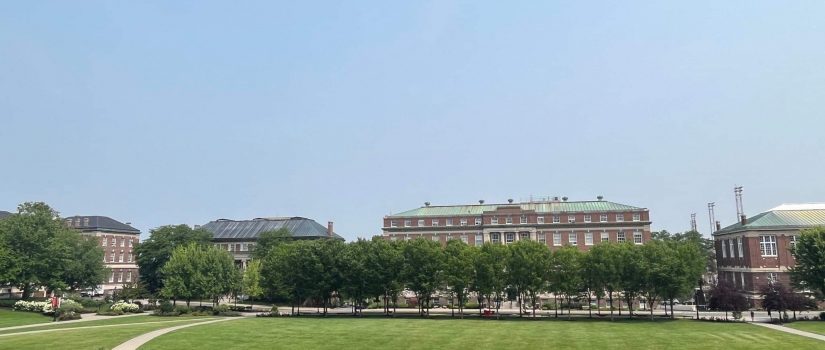Getting To Know: Rensselaer Polytechnic Institute (NY)
Rensselaer Polytechnic Institute, aka RPI, is one of the first schools that comes up among college-bound students who are serious about science and technology. If there is such thing as a “pecking order,” RPI gets on lists where Carnegie Mellon, MIT or Cal Tech are the top choices along with Ivies and Ivy-likes such as Johns Hopkins or Tufts. It’s also considered versus schools such as Lehigh and Stevens, which I have recently visited, as well as Worcester Polytechnic Institute (WPI). I had the privilege of attending a virtual counselor’s briefing, took the time to do more research on this school and took some virtual tours. I also dropped a few photos for you. I want to thank friends and colleagues Linda Jang, April Paris-Joseph and Revathi Shivakumar for sharing their photos with me.
RPI has a larger campus than Stevens or WPI.
It’s nearly 300 acres, over triple the size of WPI and nearly five times the size of Stevens. While RPI has more students than either school, it is also more invested in arts and sports facilities. The Houston Field House, home to NCAA D-1 men’s and women’s ice hockey teams seats 4,500 fans. Attendance for men’s hockey was quite strong up till the pandemic. The Experimental Media and Performing Arts Center (EMPAC) is quite impressive. I would not have expected the arts venues I saw at a such a technically-focused school.
When looking at the rest of the campus through the eyes of others, I have two words: landscaping matters. Much of the architecture that you would find at RPI, no matter the age of the building, can be found at other colleges. However, it looks better thanks to the grounds. To me, the campus has a “business-like” feel, as if to say “serious studies happen here.” But the landscaping makes it feel more welcoming.
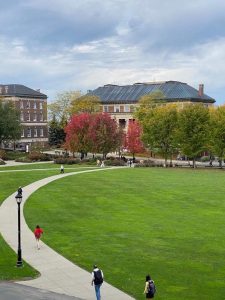
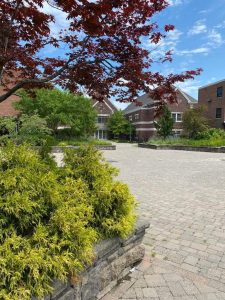
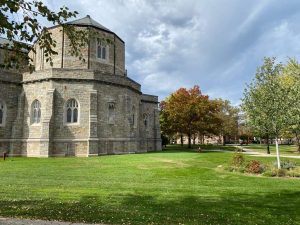
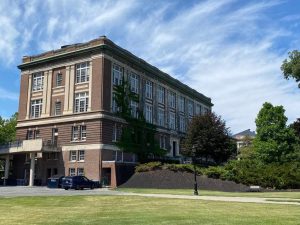
What did I think of this school from a virtual distance?
Rensselaer Polytechnic Institute is not huge, with fewer than 6,000 undergrads.
Graduate students make up only 15 percent of the total student body. There will be more opportunities to get to know faculty here than at a larger school such as Georgia Tech. However, RPI also has a larger undergraduate student body than Lehigh, Stevens or Worcester Polytechnic Institute, and there will be some big classes in the first year.
RPI is not ultra-selective for excellent students.
Sixty-five percent of those who applied to be in the Class of 2026 were accepted. The mid-points were a 1440 SAT/33 ACT/3.9 GPA/93 New York State GPA. RPI might not get to the top of the list for a 4.0+/1550/33 student. Less than a fifth of those who get in decide to deposit. But it is one of the science/technology schools that gets on their lists.
The education will not disappoint.
I read quite a few reviews and listened to more virtual student commentary than I have with most other schools. There’s almost universal agreement: the academics, no matter the major, are rigorous. But I also felt that was considered to be expected, given the marketing hype around the school, especially rankings. An RPI grad can and will compete well vs. an MIT or Carnegie Mellon grad, if they can do the work and develop collaborative skills. The institute has lost, on average, ten percent of each freshman class since 2019-20. About two-thirds of a class finishes on time. That too, could be a little better. Lehigh, for example, graduates nearly 80 percent of a class in four years, and over 80 percent of WPI students finish on time.
Rensselaer Polytechnic Institute is trying to rebound from taking some lumps.
I listened to a town hall conducted by the current president this past spring. He mentioned that RPI had 350 faculty as late as 2015, down to 285 now. There are now plans to grow back to 350 along strategic research areas. This is perhaps the only school where alumni organized a movement to “revitalize” the school. Campus politics between the students and the former president’s administration were rough and tumble before and during the pandemic. The current president, Dr. Martin Schmidt, started last year. He is an RPI alumnus who was formerly the provost at MIT.
There are some generous merit awards.
About a third of the Class of 2026 received merit awards that averaged over $36,000. That was a nice discount off an estimated total cost of attendance (tuition & fees, room & board, incidentals) of nearly $80,000. It didn’t undercut Home State U in any state, but it could have undercut out-of-state charges at the more selective public universities. If you have a science/technology bent or like the business school, and want to compete for merit and need-based aid, this might be your school.
The alumni network is impressive.
There’s over 100,000 living alumni with large communities in New York, Boston, San Francisco and Washington DC. The diligent student will find a job after graduation, and many jobs afterwards.
RPI does a great job of on-boarding a freshman class.
There are lots of outdoor recreational opportunities in New York’s Capital Region that you would not know about without the school’s help. I also like that the school used the region’s strengths to help new students to build relationships and to bond a class.
What issues do families need to consider with Rensselaer Polytechnic Institute?
Location.
Unlike Lehigh, Stevens or WPI which are close to major cities, RPI is over two hours from Boston and more than three hours from New York City. Troy, home to the Institute since its founding two centuries ago, was once the second-largest producer of steel in America after Pittsburgh. It was also known as the Collar City for its history in shirt manufacturing. A Troy meat packer, Sam Wilson, was the inspiration for ‘Uncle Sam‘ on the U.S. Army recruitment posters. The city has lost much of its industrial base, though it has an impressive downtown music hall as well as the longest-running farmers market in the country. However, you need to have access to a car to get to most places away from campus, even the Amtrak train to Boston or New York
Physical campus
The campus is built up on a hilltop overlooking the city and the Hudson River. Those who have difficultly with hills might want to consider a flatter campus. RPI shares this issue with Lehigh and Stevens. It’s also a longer schlepp into the downtown from viewing YouTubes than I saw when I visited Stevens and Lehigh in person.
Cost
If you don’t get one of the larger merit awards, Rensselaer Polytechnic Institute is really expensive. On average it met 73 percent of need for the students who were there in 2021-22. Members of the Class of 2021 who borrowed owed, on average, over $40,000. No one should borrow that much to attend any college, regardless of the publicity about rankings and returns on investment.
Summer Arch
RPI asks rising juniors to stay on campus for the summer after sophomore year. The institute offers juniors the opportunity to study abroad or pursue full-time employment during the following fall or spring. The Summer Arch is two weeks shorter (14 vs. 16 weeks) than a fall or spring semester. My personal feeling is that students should take the spring option and extend their employment or other experience into the summer. However, students need to ask how the choice of semester will impact the availability of classes that are required to graduate. This is a very good school, but there are better places for an education that includes more co-op employment opportunities.
Conclusions
I have to respect a school where the alumni care about the reputation of their alma mater long after they have graduated, especially when the president is also an alum. Rensselaer Polytechnic Institute faces a lot of competition for students and families who care a great deal about costs, rankings and return on investment. It may be the best buy for the best students in the admit pool. But it will take some time for it to become the first choice for more of those students.
Report Card: Rensselaer Polytechnic Institute (NY)
- Four-Year/Six-Year Graduation Rates: A/A
- Freshman Retention: A
- Costs: B
- Curriculum: A
- Community: B
- Comforts: B
- Connections: A
Want to know more about me?
Buy my new book, The Good College!
Listen to my latest interview on ‘Tests and the Rest’ with Amy Seeley and Mike Bergin!
Check out my talk, What Exactly Is a Good College? hosted by test-prep experts Amy Seeley and Mike Bergin on Tests And The Rest!
You might also like this talk, College Is A Learning AND Living Community hosted by Dr. Cynthia Colon from Destination YOUniversity on Voice of America Radio!
Sharing is caring!

